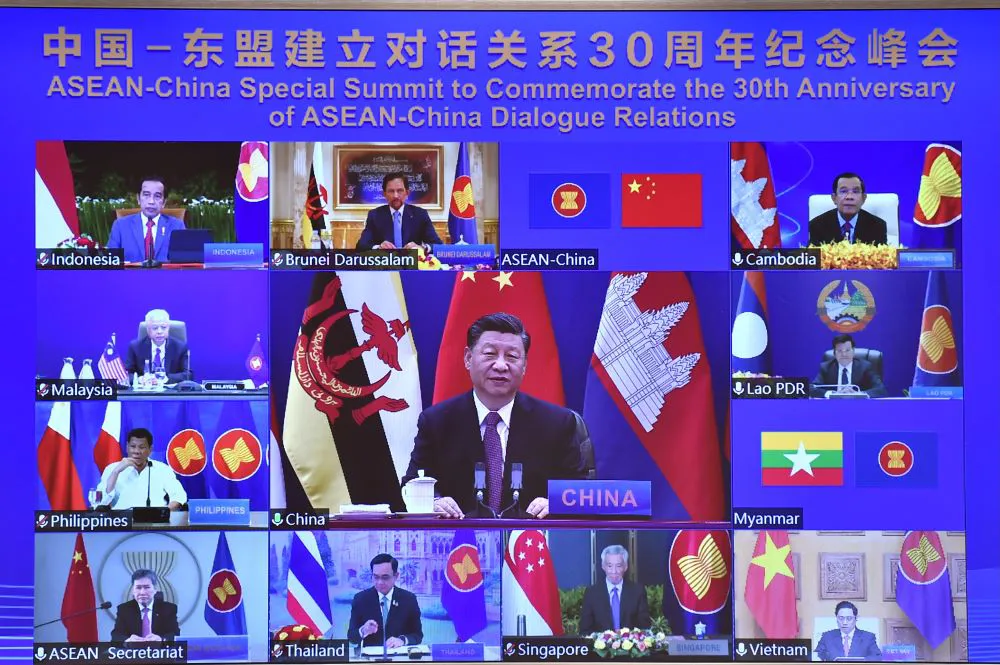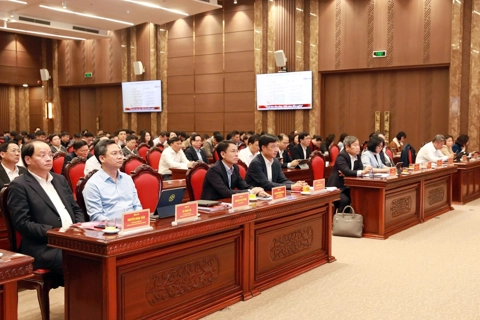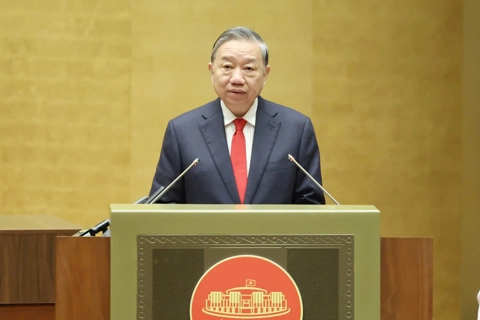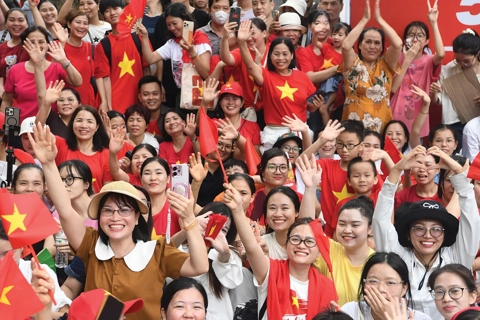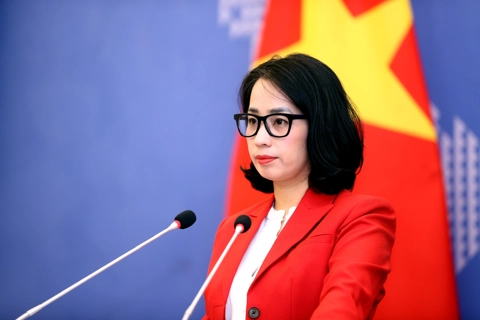ASEAN-China's strategic trust must be forged, Vietnam says
Chinese president Xi Jinping said China pursues long-term, friendly coexistence with neighboring countries, and is part of the common efforts for durable peace in the region.
ASEAN and China need to reinforce strategic trust and promote comprehensive cooperation towards higher targets and broader relations, Vietnam’s Prime Minister Pham Minh Chinh said today at the ASEAN-China Special Summit to commemorate the 30th anniversary of ASEAN-China Dialogue Relations.
| Vietnam’s Prime Minister Pham Minh Chinh attends the ASEAN-China Special Summit on Nov 22. Photo: Baoquocte |
The two sides should attach the importance to jointly maintaining peace, stability, and development in an uncertain environment, and promote cooperation to effectively respond to new challenges towards comprehensive, inclusive, prosperous, and sustainable development for each party, Chinh said at the summit held via videoconference with the participation of China’s President Xi Jinping and ASEAN leaders on November 22.
More dialogues are required to address security issues, especially those related to the East Sea [internationally known as the South China Sea], to which, the parties need to follow a rule-based approach in implementing the Declaration on the Conduct (DOC) of Parties in the East Sea and negotiating the Code of Conduct (COC) in the East Sea that abides by international law and the UN Convention on the Law of the Sea (UNCLOS) 1982, he said.
For further cooperation, Chinh hoped that ASEAN and China would boost economic connectivity with China’s facilitation of ASEAN’s exports to balance trade. "More efforts should be made to hi-tech sectors, infrastructure, digital transformation, green growth, climate adaptation, and people-to-people links."
Vietnam will contribute its part to the ASEAN-China relations to make the relations substantive, Chinh noted.
Regarding the South China Sea issues, Malaysia’s Prime Minister Ismail Sabri Yaakob said that international law must be abided by solving disputes. He emphasized that the issues must be solved in a peaceful and constructive manner to make the South China Sea merely for trade passes, according to the Vietnam News Agency. For that reason, he called for restraint from related parties and stressed the importance of UNCLOS.
| China's President Xi Jinping, leaders of ASEAN member states, and ASEAN Secretariat at the event. Photo: VGP |
Xi Jinping’s rare appearance
This marked the first attendance of Xi Jinping at an ASEAN-China summit. In today’s meeting, Xi announced the elevation of the ASEAN-China relations to “comprehensive strategic partnership”.
Addressing the summit, Xi said the gains in bilateral cooperation are attributable to the unique geographical proximity and cultural affinity and, more importantly, to the fact that both sides have actively embraced the development trend of the times and made the right historic choice, according to Chinese Xinhua News Agency.
Calling for building a peaceful home together, Xi told ASEAN countries that “China will never seek hegemony, still less bully smaller countries.”
Xi emphasized three factors that will be key to ASEAN-China relations: political trust, friendship, and win-win cooperation.
Xi pledged to intensify support to ASEAN in the Covid-19 pandemic and import more ASEAN farm produce.
The attendance of Xi Jinping at the event is part of China’s efforts to increase its influence on the region, according to Dr. Nguyen Thanh Trung, director of Center for International Studies at University of Social Sciences and Humanities, Vietnam National University, Ho Chi Minh City.
Normally, Chinese Premier Li Keqiang represented China at ASEAN-related summits. The appearance of Xi in the latest gathering underscores Beijing’s commitment to bolstering its ties with Southeast Asian countries, the Vietnamese Tuoi Tre quoted Trung.
The issue that is easy to gain ASEAN support is China’s Covid relief for the region, Trung said. He stressed that ASEAN becomes more important when China wants to be a signatory of the Comprehensive and Progressive Agreement for Trans-Pacific Partnership (CPTPP). To be admitted to the trade pact, Beijing must get the nod of all CPTPP members (including 10 ASEAN member states).
ASEAN-China: a 30-year journey
The three-decade relation between ASEAN and China has mainly focused on trade with the increasing presence of Chinese goods in Southeast Asian countries.
Trade between ASEAN and China has skyrocketed by 85 times since the two sides established their dialogue relations in 1991. In 2020, the two-way trade hit US$516.87 billion.
Since 2009, China has been ASEAN’s largest trading partner for 12 consecutive years. In 2020, ASEAN, for the first time, replaced the EU to become China’s largest trading partner.
Over the past three decades, ASEAN and China made several economic and trade milestones, including the Framework Agreement on ASEAN-China Comprehensive Economic Cooperation (signed in 2002); Agreement on Trade and Goods of the ASEAN-China Free Trade Area (FTA) (2004); Agreement on Investment signed in 2009; ASEAN-China FTA fully completed in 2010; First round of ASEAN-China FTA Upgrading Negotiations held in 2014; ASEAN-China Upgrading Protocol signed in 2015; RCEP negotiations concluded in 2019; RCEP agreement signed in 2020.



